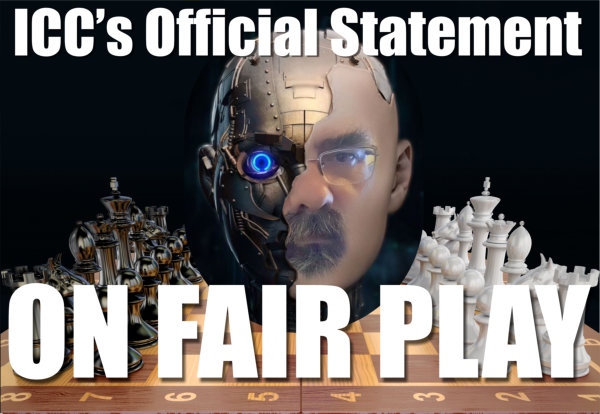Added on 10/14/2022

Online chess has become increasingly popular for both recreational play and serious tournament play, more so following the pandemic. Promoting and ensuring Fair Play has become an even more paramount issue for ICC as tournament prize funds have increased significantly over the past two years. With all the chess engines available with a button click, it becomes far too easy for players, in a moment of laziness, to lean on one to assist their play illegally. Anti-cheating measures have become critical in offering a level playing field to players and organizers for trusted online tournaments.
At ICC, we take Fair Play very seriously.
ICC is committed to offering the highest standard of Fair Play. It has been a mission of ICC's staff for more than 25 years to ensure a safe and fair playing environment for our players and to protect the integrity of chess played online.
ICC has been entrusted to oversee thousands of participants in US Chess Scholastic Tournaments, weekly US Chess online rated tournaments, and CCA cash prize tournaments having awarded over $300,000 since 2020. ICC’s Fair Play team maintains the highest Fair Play standards in overseeing these important online events. Our staff and anti-cheating methods have gone through the process of being fully approved by the United States Chess Federation with the benefit of over a quarter century of development.
Anti-Cheating Methods and Procedures.
Having experienced over 25 years of online play, overseeing millions of games every year, ICC has developed tools and procedures to detect cheating and takes rigorous steps to deal with players who violate the Fair Play rules.
We are a trusted partner of US Chess and have received their highest endorsement in the fair play area.
“The ICC’s system has a multi-level review process that uses computer analysis, their very experienced internal staff, and external high-level players. This multilevel review results in a very low rate (no known instances) of false positive detections.”
It is well-known that no anti-cheating system can be perfect, but we at ICC can proudly affirm that we are one of the foremost leaders in the industry regarding anti-cheating measures.
ICC uses a team of experts who constantly work to ensure Fair Play while constantly improving the methods used in the process. ICC scrutinizes games with analysis tools that check the correspondence with engine moves and other characteristics of assisted play. When analysis finds specific parameters over the preset thresholds, the game is flagged and further analyzed by the Fair Play team. The team then analyzes the game with a forensic approach. We conduct detailed analysis with a suite of chess engines, and other data points are collected from the player and cross-checked against peer groups.
Cash Prize Tournaments.
ICC holds cash-prize USCF-rated tournaments regularly. Most of our cash prize tournaments use longer time controls than Rapid. These longer time control events increase the team's workload. More time provides more opportunity for players to illegally access an engine. Proper oversight of lengthy time control online tournaments, with a large field of entrants, from unrated to Grandmaster, is an incredible task the team takes very seriously.
ICC staff developed a procedure to ensure Fair Play in these events. All players participating in a tournament with cash prizes must connect to Zoom, with webcams allowing tournament staff to see the player and their computer screens. The Tournament Directors are connected to the Zoom room. The number of TDs is proportionate to the number of participants so that each TD can focus on a limited number of players. During the tournament, analysis tools work in full swing, and the Fair Play team members are present online and ready to start an investigation if anything suspicious occurs. Meanwhile, the ICC team conducts a cloud analysis of all tournament games with popular chess engines, producing a screening to highlight players whose performance falls outside the norm.
As an added, independent review and cross-check, we also send all the tournament games to data scientist and Fair Play expert Professor Ken Regan for screening. Professor Regan's analysis, coupled with ICC's cloud analysis, pinpoints players needing forensic analysis. The Fair Play team checks the moves, one by one, and creates a standardized report for each game, with the analysis results and their conclusions. In addition, Prof. Ken Regan then produces a full test as a further independent player review. No cash prizes are awarded until the Fair Play analysis has concluded.
Marty Grund, one of the founders of ICC, informs a player when he, or she, has committed a Fair Play violation. In most cases, those implicated are under the age of 15. Marty takes great care handling these delicate situations with empathy in hopes of a confession and a path by which they can continue to play, recover their credibility, and not quit the game.
In addition, great lengths are taken to avoid filing an ethics complaint with the US Chess Federation. Ethics complaints are filed only in cases where complete denial occurs. When an ethics complaint is filed, the US Chess Federation Ethics Committee examines ICC's analysis, evidence, the player's explanation, and then renders a decision. If an Ethics Complaint is upheld, sanctions have resulted in up to a two-year ban from rated US Chess play. Filing an ethics complaint is a complex task. As of now, in the rare cases where ICC had to file an ethics complaint, the US Chess Federation has upheld ICC's opinion.
Fair Play is one of the most critical issues impacting online play. ICC will continue to improve its Fair Play oversight process and procedures. ICC will continue to invest and apply its knowledge, experience, and technology to give its members a safe playing environment and to protect the integrity of chess played online.